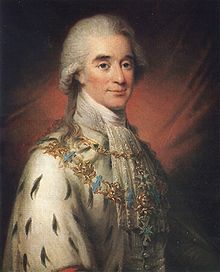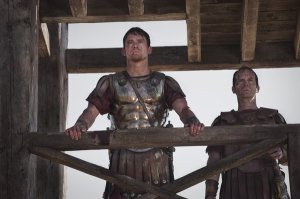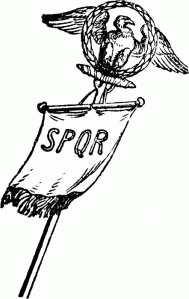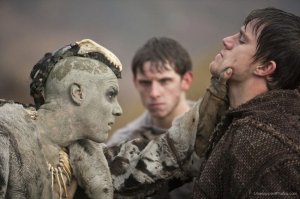Anonymous
Released: October 2011
Starring: Rhys Ifans, Vanessa Redgrave, David Thewlis
History of period in focus: Life of Edward de Vere (1560s – 1603)
(I would like to dedicate this update to my friend Tony Funari, who did a post on Shakespeare author controversy some time ago and lent me a book for research on the film!)
Barring someone going back in time or digging up some kind of miraculous document we’ve never seen, nobody will ever be able to prove or disprove that William Shakespeare wrote or didn’t write his plays. It’s impossible. However, I tend to favor the Occam’s Razor approach. What’s the simplest answer? Shakespeare got a decent enough education to write, learned the trade of theater through his company, and there is little evidence of him as a man because he lived 400 years ago and a lot of documents have been lost to time.
There. That’s it. Conspiracies and theories and all the rest of it complicate things in a way that isn’t worth it and holy crap, does Anonymous buy into some conspiracy theory.
The idea that Edward de Vere, Earl of Oxford, really wrote Shakespeare’s plays is not a new idea in the least. I think the argument is fairly compelling, although there are several reasons I ultimately reject it (which I’ll talk about). The rest that the movie asks me to believe, though, seems farcical. You mean de Vere had an illegitimate child with Elizabeth? All right, I find it hard to believe Elizabeth would allow herself to get pregnant (although I don’t doubt that she did enjoy at least some sex), but that’s not extremely outrageous. Oh, wait. You mean she had multiple illegitimate children and one of them was de Vere and she committed incest with him and Essex’s rebellion was no more than a nasty trick played on a loyal guy by the evil Robert Cecil?
Wait a minute. A conspiracy is all good fun, but five conspiracies? The more unbelievable the plot gets, the more questionable it is that the first charge – that de Vere penned Shakespeare’s plays – could be true. Although, William Shakespeare in the movie as a mostly illiterate buffoon? AWESOME.
Why Edward de Vere?
Historians have found some surviving poems and plays of de Vere and he was considered an accomplished writer at the time. He was involved in court life, which would explain the scenes in the plays that seem to have an intimate knowledge of the way royalty worked. He was raised in the house of William Cecil, Elizabeth’s chief adviser, further supporting his knowledge of court workings. Furthermore, Cecil is thought to be one of the inspirations for Polonius.
The Earl of Oxford also had extensive traveling experience. He had actually been to Italy and visited places that appeared in the plays. He would have known the weather, the customs, etc. while as far as we can tell, William Shakespeare never left England.
He was educated by university and the language in the plays is undeniably bright and playful, making a full education the likely culprit for such refinement.
Apparently, if you look at the letters and other things that Edward de Vere wrote as himself there are similarities to lines and passages in Shakespeare plays that are either deliberate or a sign of the way he wrote and phrased things.
There is a whole skein more: people who really want this theory to be true have gone through multiple plays and found instances that related to something that happened in de Vere’s life. Let’s look at a couple of these examples and you can determine for yourself if they are coincidence or buried fact.
The Merchant of Venice – The Earl of Oxford at been in Venice, so it makes sense he would know details that someone who had never been there would not know. Such as the fact that baked doves were a not weird gift or that the Duke of Venice got two votes in the city council.
Romeo and Juliet – Oxford himself had an illicit affair with a woman named Anne Vavasour which started a series of duels between her family and the people who followed him. One of these skirmishes injured Oxford and effectively “lamed” him. I should also mention that the speaker in the sonnets refers to himself as “lame” on multiple occasions.
Hamlet – In addition to the Polonious as Cecil connection, we also have the fact that Oxford was at one point kidnapped by pirates just as Hamlet is kidnapped in the play. If you look at the sources for Hamlet, the pirate attack is not included in any of them and must have been an original invention. Furthermore, after his father’s death, his mother remarried rather quickly.
But wait, there’s more! If de Vere died in 1604, how is it possible that multiple plays appeared after his death? Some of the big ones referred to here are Macbeth and The Tempest. It’s simple. Those plays had already been written and performed on some level and after 1604 they were simply revised by other people and staged again. How else can we explain Shakespeare’s silence on James ascension to the throne unless he was dead and unable to write about it?
Why not Shakespeare?
We really don’t know that much about William Shakespeare. He was born in Stratford-upon-Avon. He was educated (probably) at the local grammar school there. His father had achieved the fairly prominent position of mayor before he had to withdraw from social life, probably for debt.
We know that Shakespeare married Anne Hathaway and had three children with her. Then he sort of disappears and reappears in London as an established playwright as part of the Lord Chamberlain’s Men. He writes plays and is extremely popular.
He dies in 1616 and seven years later his friends, including Ben Jonson, produce a First Folio of his work for prosperity’s sake.
Why do we know so little about Shakespeare? We know more about some of his contemporaries. Christopher Marlowe leaps to mind as a particularly infamous person who dueled and quarreled his way into an early death. We have dedications that Ben Jonson wrote outside of his theater work. But there’s nothing of Shakespeare’s aside from his actual work. No dedications, no personal letters, no diaries, no notes scrawled into the margins of books he loved.
Furthermore, a good number of other playwrights at the time were university educated. Is a grammar school education enough to give someone the foundations they need to write these brilliant plays? There’s no specific record that exists that shows Shakespeare’s enrollment in the Stratford grammar school. It’s possible he never even went.
Surely, this man is a shadowy figure with next to nothing about him because he wasn’t a prominent playwright and someone else was writing plays under his name. After all, writing anonymously was not unusual at the time and it wasn’t unheard of for someone to adopt a pen name. It’s possible that de Vere wrote as William Shake-spear, using the hyphen to clue people into the fact that the author was really somebody else.

This is the face of lies. It’s like someone telling you that your puppy is out to kill you. Or that the Illuminati are real and Dan Brown was right.
Bardolatry and academic elitism
Here’s the thing: Shakespeare’s plays are good. They are clever and witty and contain themes that still concern people today. That does not mean Shakespeare was the best writer in the entire world and that he was an isolated genius who delivered these plays from on high. Other playwrights at the time also produced brilliant witty works that we can still read and think of as hilarious and awesome all in their own right.
Shakespeare is totally overrated.
Don’t get me wrong. I love Shakespeare plays, but the guy wasn’t the BEST WRITER EVER. He has some plays that sort of suck. He has some plays where it’s apparent that multiple passages were written by someone else which means he participated in the custom of co-writing at the time. He and other playwrights constantly borrowed ideas and good lines from each other. The theater community was tight knit and they borrowed from each other at will, working together to make the best work they could as quickly as they could.
If you read Shakespeare’s plays, they are completely rooted in the Elizabeth world. You cannot get one scene into a comedy without running into stupid sexual puns. The man wrote some intricate and meaningful verse, but holy cow did he love sex jokes as much as the next person.
(Example:
DROMIO OF SYRACUSE
No longer from head to foot than from hip to hip:
she is spherical, like a globe; I could find out
countries in her.
ANTIPHOLUS OF SYRACUSE
In what part of her body stands Ireland?
DROMIO OF SYRACUSE
Marry, in her buttocks: I found it out by the bogs.
[…nationality jokes, etc…]
ANTIPHOLUS OF SYRACUSE
Where stood Belgia, the Netherlands?
DROMIO OF SYRACUSE
Oh, sir, I did not look so low.)
The punchline in the above passage is that the Netherlands are like a woman’s vagina. Come on! That not terribly sophisticated. I think too often we are fed this story as Shakespeare as this wonderful elite writer and then all of a sudden it looks like grammar school wouldn’t be enough to create such great writing. Being a mere actor and writer wouldn’t give someone the sophistication to create brilliant works.
That’s snobbery, plain and simple.
By all accounts the grammar school in Stratford was respectable. This is not the same sort of thing as a modern day elementary school. Obviously someone leaving the sixth grade today could not write Shakespeare. In Elizabethan grammar schools, however, the boys would mostly learn Greek and Latin by way of reciting passages from old plays and works. Anyone with an education would be familiar with these works and that makes the Comedy of Errors less spectacular. The plot is directly ripped from Plautus’ Menaechmi about a set of twins everybody confuses with each other all day. Formal education would have stopped at about the age of 15, which gets him into high school range, at least.
The movie’s contention that his father was “unquestionably illiterate” is probably not true. How did he become a bailiff without any education? It seems unlikely.
There’s a term coined by George Bernard Shaw (an awesome playwright himself) about Shakespeare: “Bardolatry.” We idolize Shakespeare’s work and have raised him up to be this magnificent untouchable author that his unquestionably a genius. That’s why kids read him in school and get bored to death. Have you ever been hyped to death about a movie and then found it worse than you might have going into it without knowing anything? Same thing with Shakespeare. You see a million pop culture references to Romeo and Juliet and suddenly the play is boring.
The movie contributes to the idea of Bardolatry in spades. Multiple times throughout the other playwrights look at his works in awe, amazed that he could ever write something so magnificent. The fact that he hands over a play in iambic pentameter blows all their minds. “Entirely in verse?” Ben Jonson asks in the movie, staring at de Vere like he might want to make out with him.
Oh wait. They all wrote in verse. Look at the other plays we still have from the time. Large portions of them are in verse!
Take Ben Jonson, one of the playwrights in the film who is completely awed by de Vere’s verbal skill. He wrote the play Volpone, which you might have read in high school or as an English major. Be honest, could you tell the difference between this play and Shakespeare? Probably not.
(For example:
MOSCA: He has no faith in physic: he does think
Most of your doctors are the greater danger,
And worse disease, to escape. I often have
Heard him protest, that your physician
Should never be his heir.
CORBACCIO: Not I his heir?
MOSCA: Not your physician, sir.
CORBACCIO: O, no, no, no,
I do not mean it.
MOSCA: No, sir, nor their fees
He cannot brook: he says, they flay a man,
Before they kill him.
CORBACCIO: Right, I do conceive you.
MOSCA: And then they do it by experiment;
For which the law not only doth absolve them,
But gives them great reward: and he is loth
To hire his death, so.)
Looks to be in verse, doesn’t it?
I don’t know why the legend of de Vere scribbling away in solitude holds so much sway. The Elizabethan theater community constantly borrowed from each other and worked together. There is evidence that some of Shakespeare’s plays were co-written. Hell, The Two Noble Kinsmen actually had John Fletcher listed on the cover page as an author along with Shakespeare! Honestly, it makes much more sense to me that a man who worked with others, borrowed good lines and characters ideas from others, and lived among the people so he understood their particular brand of humor would write some good and popular stuff. It makes less sense to me to dismiss all these moments of collaboration as people adding to de Vere’s plays after the fact or borrowing from what he had already done. Shakespeare’s works might have been popular, but there were a lot of other popular playwrights at the time. They were not completely overlooked.
One last thought here. According to Bill Bryson:
Only 230 or so play texts still exist from Shakespeare’s time, including the thirty-eight by Shakespeare himself – about 15 percent of the total, a gloriously staggering proportion.
Maybe if we had more plays or fewer of Shakespeare’s, he would need seem so great to us as he is.
Why would he have to hide?
The movie posits that de Vere had to keep his writing a secret because it wasn’t a noble enough pursuit. This was mostly thrust on the shoulders of the Cecil family, who were strict puritans and forbade him to do any of that nasty writing stuff.
First, congratulations to William Cecil for becoming a villain! I have never seen this man portrayed as a total dick before, and I was a little proud of him for having reached horrible monster status.
Secondly, de Vere was known as a poet and playwright in his own time. He is mentioned on several lists as a respected writer who people knew and whose work got performed! He was involved in the theater and had his own company he did patronage for, Oxford’s Men. If people already knew him as a writer, why would he not attach his name to his work? Why wouldn’t he have his own company perform his stuff?
Anne Cecil, his first wife died in 1588 after they had multiple children together. His affair with Anne Vavasour was around 1581 and that’s when his son with her was born. If she was the inspiration for Romeo and Juliet, it took him awhile to write it (unless, of course, he kept it in hiding for awhile). As his wife Anne Cecil is hugely against him writing in the movie and complains when he begins to focus on it again, the fact that she died 10 years before the movie takes place makes that theory a little weaker.
Lastly, some experts have compared writing styles and suggest that de Vere’s poetry is actually not as sophisticated as Shakespeare’s. This problem fixes itself if you say the only remaining stuff we have from de Vere is his early work and all the later stuff is under a pen name. Still, wouldn’t it be hilarious if a university educated man wrote with less sophistication than a grammar school graduate?
Elizabeth and the many children
This is the part where the movie falls apart for me. I would like to give the film some credit for not coming up with this on their own (Roland Emmerich at least borrowed silly theories from other people instead of making up his own like Immortal Beloved does). Despite this, I find it incredibly hard to believe that Elizabeth had at least three bastard children.
I do not doubt that she had one or maybe more lovers in her lifetime. Her close friendship and relationship with Robert Dudley (later the Earl of Leicester) could have led to something. She practically married him. Furthermore, her favor for the Earl of Essex might have led to something. Yes, the man the movie claims to be her son might have been her love interest. Which would not be too out of the realm of creepy considering de Vere is also supposedly her lover/illegitimate child.
Why don’t I believe it? It seems incredible to me that Elizabeth would have been able to have a bastard son at the age of 16 in secret. She wasn’t queen yet and Mary would surely have been looking out for an excuse to shame her sister and prove why she was a better option for queen. One illegitimate child while she was at the height of her power and able to have it in secret? Maybe. But remember, royalty was surrounded by people at all times. I feel like there would be some evidence from a lady in waiting or a family who adopted the baby or rumors of her pregnancy or something.
Also, Elizabeth was an intelligent woman. While she might have fooled around a little bit, she surely would not have allowed herself the risk of getting pregnant multiple times by men who were not married to her. Her position as queen was tenuous enough as is without throwing morality into the mix. It would have been far more in her interest to avoid getting pregnant at all costs and I feel like that is much more probable than multiple pregnancies and all of men who would rise up in court favor and power without her ever knowing that they are her children. Really guys?
The Earl of Essex
There have been suggestions that Elizabeth was sexually interested in him, which makes the mother-son possibility creepy. Probably not true.
Other than that, this guy was not a poor blameless victim lulled into treachery by the evil hunchbacked Robert Cecil. He was sent to Ireland to lead campaigns and take over the land. He wasn’t doing a good enough job and the queen told him so. In 1599 she wrote to him and forbade him to leave Ireland without her permission, so naturally he got all his stuff together, left the care of Ireland with another guy and sailed back to London.
When he returned there was a whole intrigue with him. Hugh O’Neill, a man Essex had been with in Ireland decided that he wanted to march on the queen. As O’Neill and Essex had some secret conversation a bunch of people started to speculate that maybe Essex was in on the plot to overthrow Elizabeth.
Despite the fact that he had been put under house arrest, Essex decided his best case for defending himself would be a personal audience with Elizabeth, so he naturally broke the arrest and went to court to see her. This, he realized was not the best idea, so he turned back. But it was too late. Robert Cecil had him declared a traitor and he was executed.
At this time, Cecil had gained considerable authority with the queen. I should also mention that he and Essex hated each other and been jockeying for power for awhile. So, who knows. Maybe he did get screwed over a little.
Let the English/History major nitpick!
There are other things not true in this movie that I wanted to point out, even if I largely focused on the authorship question. They are not all terribly important, but food for thought.
– At the age of 17, de Vere killed Thomas Bricknell, a servant at the house, while practicing fencing with another guy. He was not hiding behind a curtain after trying to steal de Vere’s writings.
– Macbeth was almost certainly performed for James I after he became king. It includes reference to him (the play takes place in Scotland and James was king of Scotland first) and deals a lot with witches. James loved witches and had actually written a book on how to hunt them down. It’s practically tailor made for him! If de Vere died before James I became king, did he write the play guessing that he would?
– Ben Jonson had a fixed position with the Admiral’s Men by 1597 and in 1598 was listed by Francis Meres as one of “the best for tragedy.” Far from the struggling young man he is in the film.
– Kit Marlowe was probably a spy for the crown, and a playful, impestuous person. He had a quick wit and was quick to draw a sword. I doubt he was killed by conspiracy and I doubt he was as much of a douche as he is in the film.
– James I might be considered gay by modern standards (although you cannot judge him as such back then because sexuality had not been defined in that way) but I sincerely doubt he was the wince-inducing lisping fool he’s portrayed as in the film. Thanks for negative portrayal of LGBTQ characters, Roland Emmerich.
– How did de Vere basically show A Midsummer Night’s Dream at court as a young boy and then EVERYBODY FORGOT?

You wrote that – what’s it called? – so long ago and I remember…wait. Who are you and why are you kissing my hand?
– The stabbing scene in Julius Caesar is more or less portrayed as the end of the play. It happens in Act II. The play is not yet halfway through.
– When Jonson goes to tell the Master of Revels about this shocking new play, it makes no sense because the Master of Revels would have already known. He had to approve of all plays that would be staged.
There you have it! There are a million more things to say, but I’ll leave you at this and maybe come back and revisit the film if there’s enough more to say about it. When you come down to it, the movie takes conspiracy a step too far. I would buy the idea of Edward de Vere as Shakespeare more if all the other conspiracies didn’t get in the way. Still, it’s pretty entertaining. Like I said, the guy who plays Shakespeare is gold.
PARTING THOUGHT: George Arents, a well known book collector, decided that de Vere couldn’t have written Shakespeare’s plays. How? He had a collection of tobacco related works and letters. Just a mention of tobacco would get it into the collection. Arents said he would only buy a copy of Shakespeare’s First Folio if it had one mention of tobacco in it. No dice. Shakespeare never wrote about it. However! There are some of de Vere’s writings that reference smoking and tobacco. Good enough for Arents to claim that de Vere couldn’t have written Shakespeare, or there would be some smoking in there.
Sources:
Stanley Wells. Shakespeare & Co.: Christopher Marlowe, Thomas Dekker, Ben Jonson, Thomas Middleton, John Fletcher, & the Other Players in His Story. This is a great look into the collaborative world of Elizabethan theater and why none of those playwrights were standalone geniuses.
Bill Bryson. Shakespeare: The World as Stage. An attempted look at the “bare bones” of the Shakespeare biography. Paring away all the crap he can.
Mark Anderson. Shakespeare by Another Name: The Life of Edward de Vere, Earl of Oxford, the Man who was Shakespeare. Anderson gives his extensive reasoning as to why the plays must have been written by de Vere. A fun look into conspiracy, if you like that sort of thing.
Stuff you Missed in History Class. The episode on George Arents for that little tidbit about tobacco and the connection to de Vere.











































































